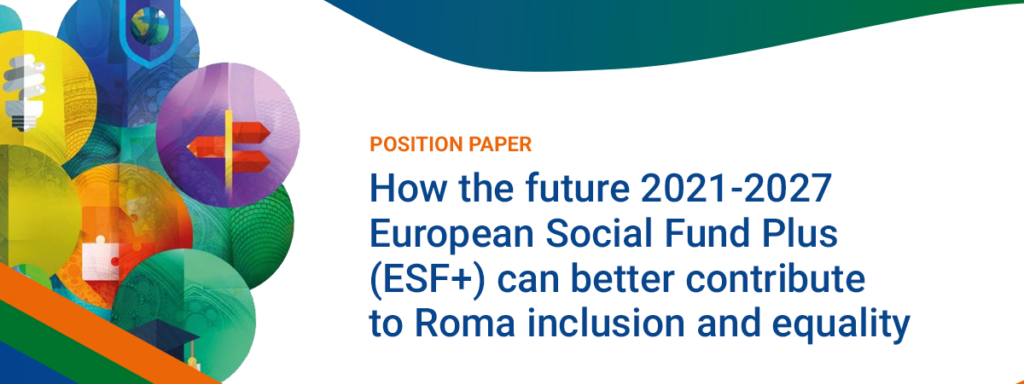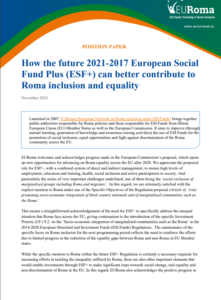
 EURoma closely follows the discussions on the post-2020 EU Multiannual Financial Framework and actively contributes to them based on Network partners’ experience and ongoing reflection processes within the Network. This is EURoma’s contribution to the Proposal for a future ESF+ Regulation 2021-2027.
EURoma closely follows the discussions on the post-2020 EU Multiannual Financial Framework and actively contributes to them based on Network partners’ experience and ongoing reflection processes within the Network. This is EURoma’s contribution to the Proposal for a future ESF+ Regulation 2021-2027.
EURoma welcomes and acknowledges progress made in the current proposal, which opens up new opportunities for advancing on Roma equality across the EU after 2020.
We appreciate the proposed role for ESF+, with a combined system of direct and indirect management, to ensure high levels of employment, education and training, health, social inclusion and active participation in society. And particularly the series of very important challenges underlined, one of them being the ‘social exclusion of marginalised groups including Roma and migrants’.
In this regard, we are extremely satisfied with the explicit mention to Roma under one of the Specific Objectives of the Regulation proposal (Article 4):’(viii) promoting socio-economic integration of third country nationals and of marginalised communities such as the Roma’. This means a straightforward acknowledgement of the need for ESF+ to specifically address the unequal situation that Roma face across the EU, giving continuation to the introduction of the specific Investment Priority (I.P.) 9.2. on the ‘Socio-economic integration of marginalised communities such as the Roma’ in the 2014-2020 European Structural and Investment Funds (ESI Funds) Regulations. The maintenance of the specific focus on Roma inclusion for the next programming period reflects the need to reinforce the efforts due to limited progress in the reduction of the equality gaps between Roma and non-Roma in EU Member states.
While the specific mention to Roma within the future ESF+ Regulation is certainly a necessary requisite for increasing efforts in tackling the inequality suffered by Roma, there are also other important elements that would enable investments through ESF+ to make significant steps towards social change, real equality and non-discrimination of Roma in the EU. In this regard, EURoma also acknowledges the positive progress in relation to increasing the alignment of ESF+ and all EU Funds with the European Semester and the European Pillar of Social rights.
Another relevant step forward is the establishment of Enabling Conditions, understood as a continuous process, having to be fulfilled during the whole programming period. This will certainly allow for a better focus and impact of the funds at national level, going beyond a light requisite for Member States acceding funds but rather a permanent requirement for consistency between policy and financial instruments. In this sense we welcome the provision to strengthen the ESF+ alignment with the European Semester –being the Country Specific Recommendations (CSR) a key tool for guiding ESF+ investments.
Despite these very important elements for progress within the ESF+ Regulation proposal, there are other aspects that we consider should be improved in order to make the ESF+ a more powerful instrument for achieving equality, social inclusion and non-discrimination of Roma across the EU.
Click here to read the full position paper.

